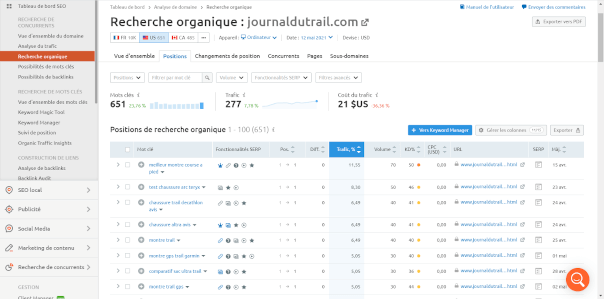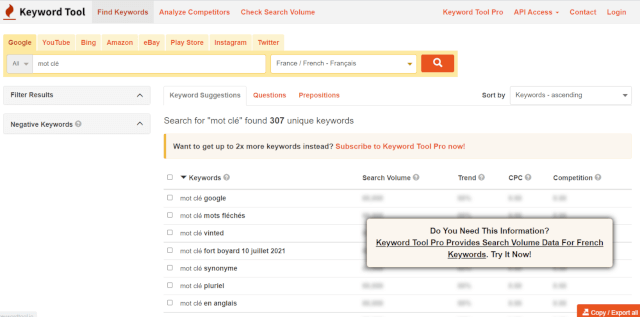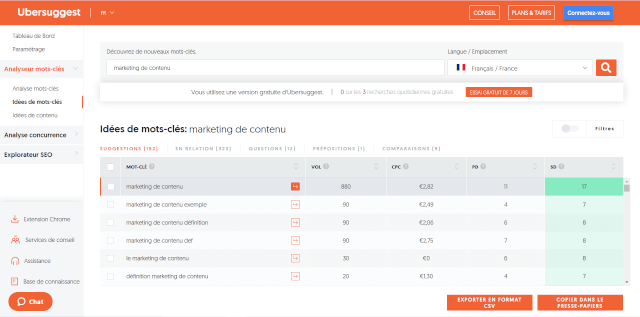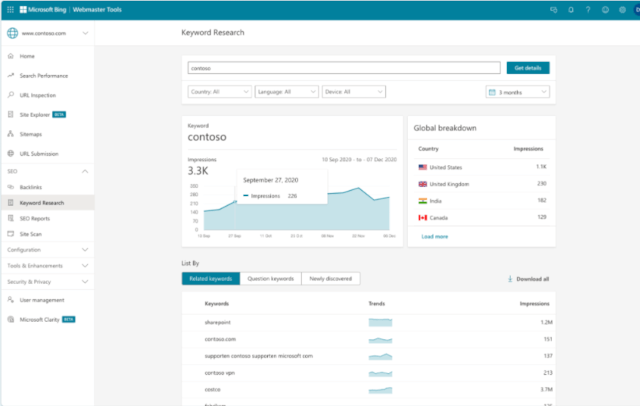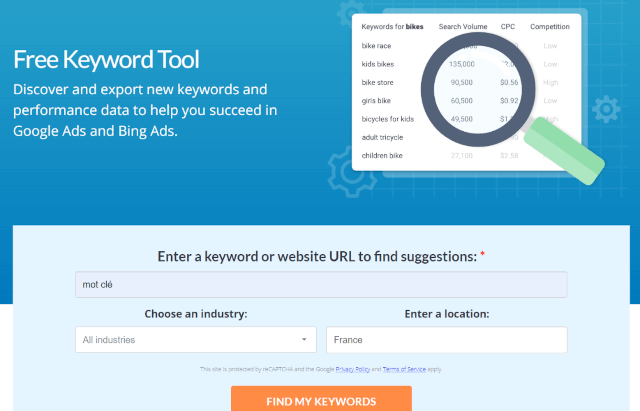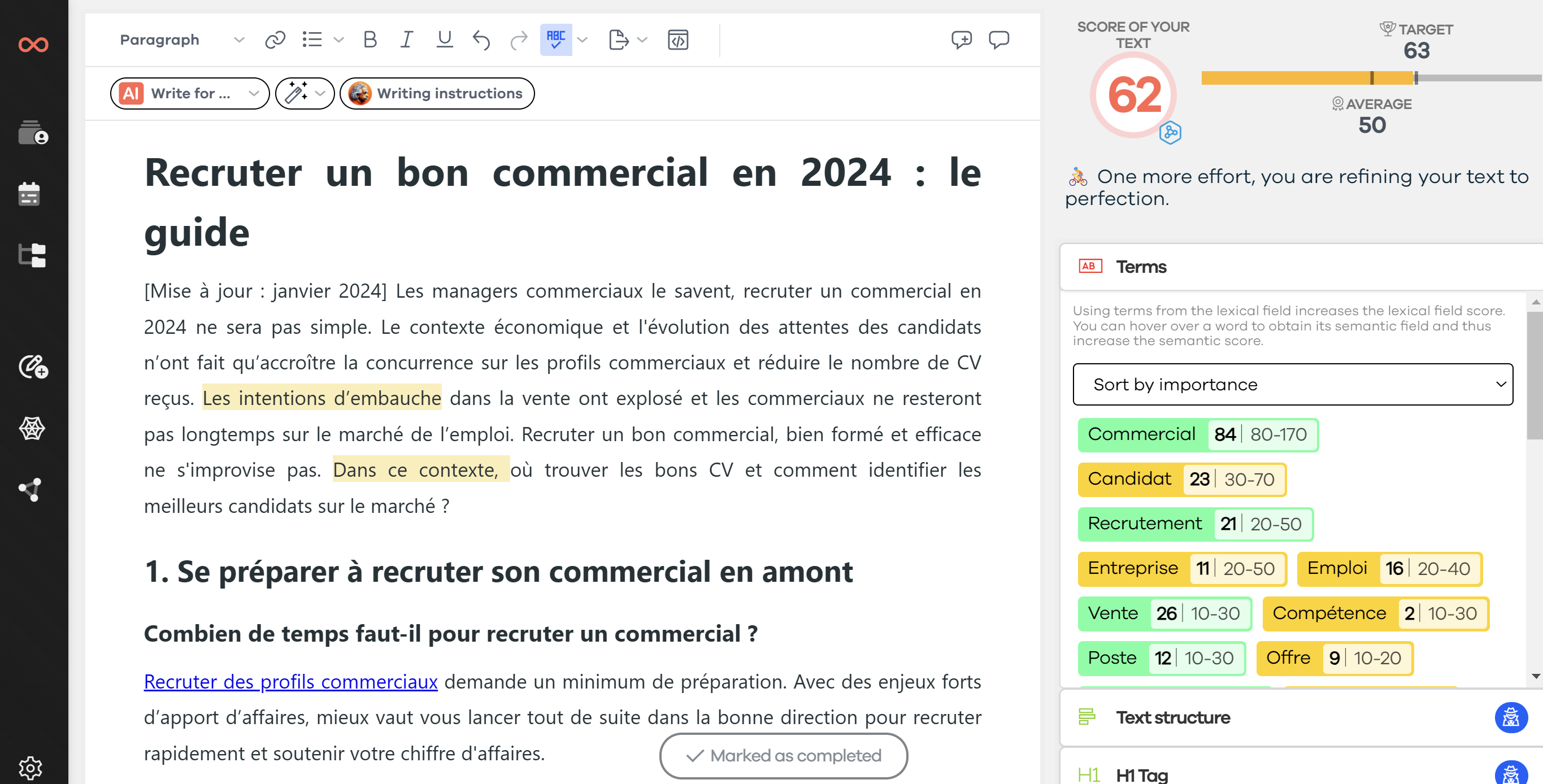Everyone has been in the position where there are a million things to do to start an SEO project, but the client (or yourself) always needs a Keyword Research first. Keyword research is one of the most important topics in organic search engine optimization. It has such a significant impact that it is inconceivable to start an SEO campaign without it! What makes it so important is the fact that users and search engines rely on keywords to find information, a website...
This article does not describe the tedious process of keyword sorting (which I will describe later), but rather how to get started by establishing a keyword list for the audience.
Today, keyword research is still important, but in a different way than what was practiced in the past before the arrival of Google Rankbrain. The purpose of this post is to show how keyword research continues to be useful, to highlight the many keyword research tools, but also the keyword typologies. Keywords are the cornerstone of a successful project, choosing them well will save you time and money.
📙 What are keywords in organic search engine optimization?
In SEO, keywords are the ideas and topics that define the content of your website page. In terms of organic search engine optimization, they are the words and phrases that users use in search engines, also called "search queries", "key queries" or "search expressions".
As a website webmaster and content creator, you want your page's keywords to be relevant to what users are searching for. As a result, they have a chance to find your content among the many web results.
💥 Why are keywords important?
Keywords are important because they are the link between what people are searching for and the content you provide to meet that need. In search engine rankings, your goal is to generate organic traffic to your site from search engine results pages (SERPs). The keywords you choose to target (those you include in your content) determine what type of traffic you will get.
Thanks to various tools, you can determine the traffic volume, especially based on the estimated number of clicks. It may then be interesting to launch paid campaigns (SEA) depending on your results and needs. You may then be led to use Keyword Planner, an essential keyword suggestion and planning tool. It allows you to find the best keywords to launch your Adword campaign. Be sure to choose your keywords based on your audience.
❓ Keyword research: is it necessary?
First of all, what is keyword research?
Keyword research is the process of searching for and selecting words and phrases that users will search for, which directly relate to your business, product, or service.
Keyword research may seem like the most basic and mundane task. Perhaps, but it is still necessary to do it from time to time.
Let's face it. If you target the wrong keywords, you will completely miss your market. If, in addition, you target competitive keywords, you will never be ranked and therefore read. Don't forget that user intent evolves over time.
If you use the wrong keywords for your client (or for yourself), you will attract the wrong visitors to the website, and no one will buy.
Where to start? Keyword research should answer the following question "What does my target/audience want to know exactly about my product/service?" The key to success is to know your target and their way of thinking.
I usually answer these questions before starting keyword research:
- What is the solution (product or service):
- How will you solve the target audience's problem?
- What mechanism allows this solution to work?
- How is it superior to competitors?
- Preliminary research (in order to use the same vocabulary as the audience):
- What articles are most popular on this topic?
- Which YouTube videos are popular (views, comments) on this topic?
- What questions are asked in forums? Facebook groups?
🎯 Choosing the right keywords: the 3 main types
It is important to understand that there are three main types of keywords that belong to different stages of the conversion funnel. The question or keyword shows at which stage your prospect should land.

Here are the 3 main types of keywords:
- Top-of-the-funnel keywords are informative (definition of..., the best way to do it for..., step by step for..., how...)
- Middle-of-the-funnel keywords are commercial: searching for solutions and comparison (ways to..., reviews for..., choose...)
- Bottom-of-the-funnel keywords are transactional, focusing on high purchase intent (price for..., best..., order..., where can I buy...)
Top-of-the-funnel keywords are informative in nature, while bottom-of-the-funnel keywords are transactional. This is the biggest separation between your keyword list. I discuss this in more detail in the article: semantic conversion service.
♘ Decide on the strategy to adopt
What type of keywords should I prioritize?
In your content marketing strategy, each SEO campaign and keyword research should be done based on objectives.
Should you focus on building a long-term relationship with the audience? Or on an audience looking to compare products? Or an audience ready to buy?
If you plan a large-scale, long-term campaign for your audience, it would be best to target top-of-the-funnel keywords, or even middle-of-the-funnel ones. But if you are building an SEO campaign for an e-commerce site, it would be best to target bottom-of-the-funnel keywords first.
That's why there are many ways to perform keyword research in SEO. Each project is based on objectives, target audience, and business needs.

Create a mindmap for your keywords, regardless of the type of keyword you decide to focus on. This will allow you to track your prospects' journey on your site.
It is best that the keywords and top-of-the-funnel pages lead prospects to the next step in the funnel. And so on, until the purchase phase: the bottom of the funnel.
The number of keywords you will target depends on the size of the site and the SEO budget.
My tip: from your mindmap, map the keywords and compare the content you already have and the missing ones to establish a priority list.
🧠 Keyword research: brainstorming
To start, think about keyword ideas. Try to guess what expressions users use when searching for your products and services. Be creative, create a text file or spreadsheet, and start writing.
Think in terms of questions and needs
People use search engines to find the answer to a question. They use keywords to formulate that question. Instead of directly thinking about keywords, think about the questions people ask who need or want your product/service.
To help you in this keyword research, you can draw inspiration from the most frequently asked questions from your customers. On the other hand, don't hesitate to take into account the suggestions offered by Google when you type a keyword in the search bar.
Your site, your products, or your services are answers. So try to find the questions (like in the Jeopardy game). Once you have found these questions, think of all the different keywords that allow expressing them.
Think of the perfect visitor
Your goal is to attract qualified traffic. By making sure to attract the right visitors, you put all the chances on your side to improve your conversion rate.
At the beginning of your organic search engine optimization strategy, try to describe your perfect visitor. Here are some questions to help you define it better:
- What is their knowledge?
- What are they looking for?
- What language do they use?
- What questions do they ask?
To go further, I invite you to read the article on creating SEO personas.
Think laterally
Lateral thinking allows you to look at things from a new angle. Indeed, knowledge sometimes constitutes a disadvantage because you know your product/service/industry too well and you cannot understand someone who does not know your sector of activity.
For example, if you are a plumber, you probably use very different terms from those of your clients. Avoid using specialized vocabulary to describe your services and prefer general concepts. How would you describe the products offered by other industries for which you have little knowledge? Don't hesitate to ask your clients how they found you!
🏆 My TOP tools for keyword research
There is a plethora of tools and techniques for creating a keyword list from a single idea. However, not all tools are equal. Some offer additional data such as search volume. To successfully complete this quest, access to a tool with keyword ideas and relative indicators for one keyword compared to another is an absolute necessity.
For your information, Google has recently blocked access to search volume data in its planning tool for anyone without an active account.
But how to determine and find the most searched keywords? Here is the list of tools that will help you to carry out your keyword research (in order of preference).
- SEMRush: SEMRush is a keyword tool that is recognized for its huge database of keywords in 26 different countries. SEMRush results return keyword ideas, estimated search volume, estimated CPC, keyword difficulty score, and currently ranked domains for a keyword. One of the most comprehensive databases after Google.

- Keywordtool.io: this tool retrieves keyword ideas from Google, YouTube, Bing, and even Amazon. You can choose suggested keywords in each country, language, and Google location. With the free version, you will get hundreds of suggested keywords, but you will need a paid subscription to access search volume estimates.

- Ubersuggest (by Neil Patel): Neil Patel (famous marketer) offers his own dedicated keyword explorer by buying the Ubersuggest tool. You can use the tool from anywhere in the world to perform your search. Filtering options allow you to exclude your specific query term to get more ideas, or even choose only question phrases that contain your keyword. Keyword results include query ideas related to estimated search volume.

- Bing: Although not the obvious choice, Bing's keyword tool can still provide useful information on related keywords. You must have a verified website in Bing's webmaster tools to use the tool, but it is otherwise free to use. Keyword ideas are not as broad as those you might get from other free keyword tools. However, one advantage in favor of Bing is that they display the exact search volume for free.

- Wordstream: Mainly a paid tool to help marketers manage their PPC campaigns, Wordstream has a freemium keyword tool that allows a limited number of searches. Wordstream's free results display search volume by keyword. At the time of updating this article in July 2021, the results page for this tool was not working. I have nevertheless decided to leave it and will check its availability in the coming weeks.

During this same update, I also removed Google's keyword planning tool (Google Ads) from the list. Indeed, it has become solely based on paid search engine optimization (SEA) campaigns, which no longer corresponds to the subject covered in this post.
On the other hand, I took the opportunity to test the tools that you took the time to advise me in your comments. I thank you very much and encourage you to continue sharing your information with the community.
KWFinder (thanks Julien), Yooda Insight (thanks Optimoz), and Cocolyze (thanks Ailsa) indeed seem to offer accurate results regarding search volume and keyword concordance. I would add to this list Ranxplorer, a French tool that offers exact search volumes for each keyword. To discover these tools and choose the one that suits you best, you can take advantage of a free trial.
🎁 Bonus: SEOQuantum's free keyword research tool
If you don't know what long-tail SEO is, you can read the article: generate qualified traffic thanks to the long tail. I have created a special long-tail keyword research tool for you.
The SEOQuantum "Keywords Suggests" tool is a free, easy-to-use tool that shows you the results of keyword suggestions from search engines like Google, Amazon, Wikipedia, Yahoo, Bing...
First, go to Keywords Suggests (https://www.seoquantum.com/keywords-finder) and enter a fairly broad keyword in the search field. For example, if you are looking for keywords related to insurance, you can use the keyword "insurance":

Keywords Suggests will automatically display the suggested results on the different sites.
You can download the results in a CSV file by clicking on the download icon in the top right corner of the page:
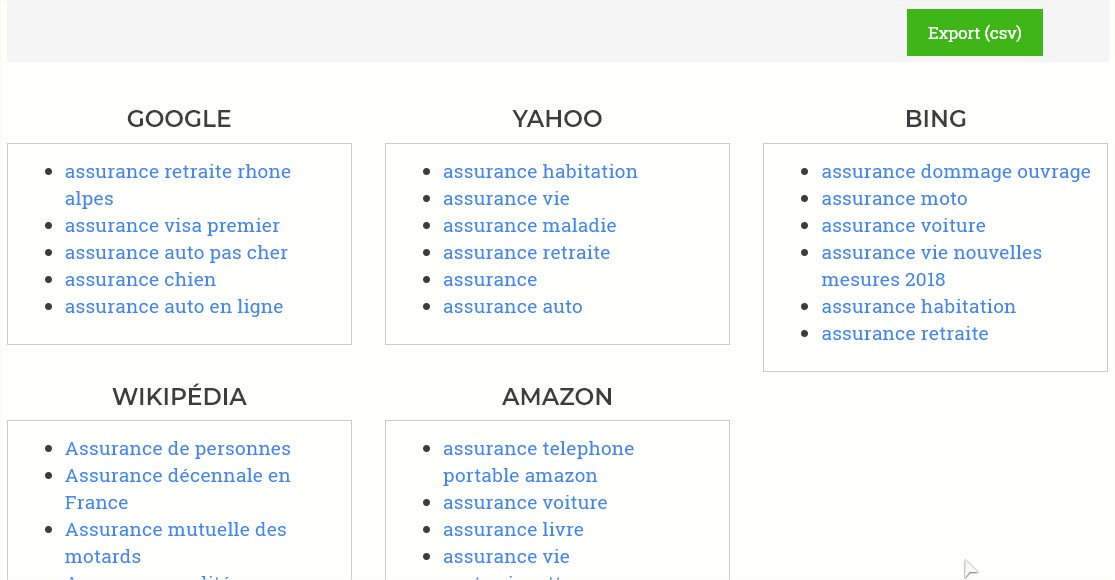
It's a great tool because it shows you keyword ideas from sites that your competition probably ignores.
🕵️ Find keywords from the competition
Of course, you can complete your list by observing your competitors. Searching and analyzing your competitors' keywords is one of the best ways to optimize your keyword strategy.
In a dedicated article on your competitors' keywords, we will learn how to identify the keywords your competitors use. You can then evaluate their performance and use this information effectively.
I remind you that this process is essential to your overall content marketing strategy. Indeed, the analysis of your SEO competition is a step that you must not neglect in order to stand out and outperform your competitors in the SERP!
⚡ How to use keywords?
Once the list and choice of keywords have been validated, you can now move on to the integration or content creation phase for this keyword. There are 7 key elements (also called "hot zones") where you should place your keywords:
- The Title tag
- The Meta description tag
- Hierarchical titles
- The content
- Images
- The URL
- Link anchors
To learn more about the strategic points to respect, refer to our dedicated article: how to integrate keywords into your web page?
🎯 Find the right keywords to get quality traffic
Do you want your SEO campaign to perform? Generate qualified traffic? Capture leads? And convert visitors into buyers? You must have the right keyword strategy!
Remember that the wrong keywords on your website will attract a bad audience with a high bounce rate. First of all, this will not allow you to get a good return on investment from your organic search engine optimization campaign. On the other hand, you will send a negative message to Google, which is likely to downgrade your positioning on the search engine.
As you have understood, choosing keywords for SEO is of great importance. This choice will determine the success or failure of your ranking. Now that you know the basics, I suggest you go further by discovering how to clean up this list of keywords and select the most relevant ones: the 2 techniques to use to choose the right keywords.
And you: what is your point of view on the importance of using the right keywords and keywords? Let me know in the comments.
Need to go further?
If you need to delve deeper into the topic, the editorial team recommends the following 5 contents:

